语法 Chapter 12 状语从句 Part 1(时间状语从句)
- 格式:pptx
- 大小:2.03 MB
- 文档页数:98
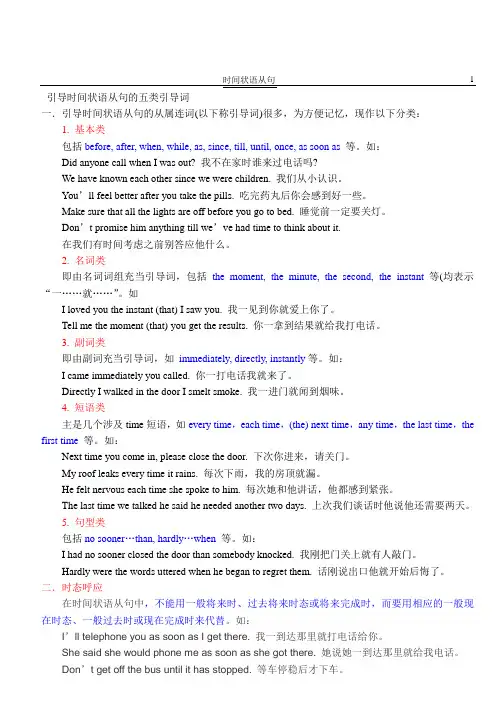
时间状语从句引导时间状语从句的五类引导词一.引导时间状语从句的从属连词(以下称引导词)很多,为方便记忆,现作以下分类:1. 基本类包括before, after, when, while, as, since, till, until, once, as soon as 等。
如:Did anyone call when I was out? 我不在家时谁来过电话吗?We have known each other since we were children. 我们从小认识。
You’ll feel better after you take the pills. 吃完药丸后你会感到好一些。
Make sure that all the lights are off before you go to bed. 睡觉前一定要关灯。
Don’t promise him anything till we’ve had time to think about it.在我们有时间考虑之前别答应他什么。
2. 名词类即由名词词组充当引导词,包括the moment, the minute, the second, the instant 等(均表示“一……就……”。
如I loved you the instant (that) I saw you. 我一见到你就爱上你了。
Tell me the moment (that) you get the results. 你一拿到结果就给我打电话。
3. 副词类即由副词充当引导词,如immediately, directly, instantly等。
如:I came immediately you called. 你一打电话我就来了。
Directly I walked in the door I smelt smoke. 我一进门就闻到烟味。
4. 短语类主是几个涉及time短语,如every time,each time,(the) next time,any time,the last time,the first time 等。



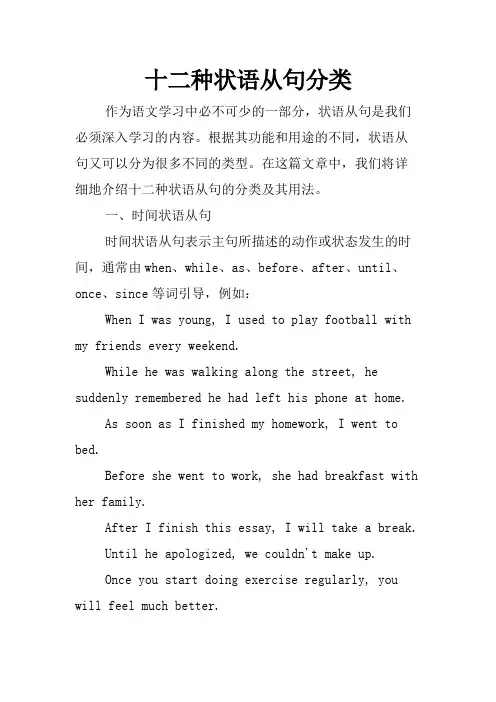
十二种状语从句分类作为语文学习中必不可少的一部分,状语从句是我们必须深入学习的内容。
根据其功能和用途的不同,状语从句又可以分为很多不同的类型。
在这篇文章中,我们将详细地介绍十二种状语从句的分类及其用法。
一、时间状语从句时间状语从句表示主句所描述的动作或状态发生的时间,通常由when、while、as、before、after、until、once、since等词引导,例如:When I was young, I used to play football with my friends every weekend.While he was walking along the street, he suddenly remembered he had left his phone at home.As soon as I finished my homework, I went to bed.Before she went to work, she had breakfast with her family.After I finish this essay, I will take a break.Until he apologized, we couldn't make up.Once you start doing exercise regularly, you will feel much better.Since we arrived here, we have been exploring the city.二、地点状语从句地点状语从句表示主句所描述的动作或状态发生的地点,通常由where、wherever等词引导,例如:I still remember the restaurant where we had our first date.Wherever you go, I will follow you.三、原因状语从句原因状语从句表示主句所描述的动作或状态的原因,通常由because、since、as、now that等词引导,例如:Because he was tired, he decided to stay at home tonight.Since it started raining heavily, we decided to cancel the picnic.As he was driving too fast, he was stopped by the police.Now that you are here, we can start the meeting.四、方式状语从句方式状语从句表示主句所描述的动作或状态的方式,通常由as、as if等词引导,例如:He swept the floor as if he had done it many times before.We should learn to speak English as fluently as native speakers.五、条件状语从句条件状语从句表示主句所描述的动作或状态的条件,通常由if、unless、provided that等词引导,例如:If it rains tomorrow, we will stay at home.Unless you hurry up, we will miss the bus.Provided that you finish your work on time, you can take a day off.六、目的状语从句目的状语从句表示主句所描述的动作或状态的目的,通常由in order that、so that、that等词引导,例如:We turned on the lights so that we could see clearly.I'm taking this course in order that I can improve my writing skills.I'm studying hard so that I can get a good grade.七、结果状语从句结果状语从句表示主句所描述的动作或状态的结果,通常由so that、such that等词引导,例如:We worked so hard that we finished the project ahead of schedule.He played so well that he won the championship.The problem was such that we couldn't solve it on our own.八、让步状语从句让步状语从句表示主句所描述的动作或状态与条件相反,通常由although、though、even though、in spite of the fact that等词引导,例如:Although it is raining, she still went to the gym.Though he is young, he is very talented.Even though I was very tired, I stayed up late to finish my work.In spite of the fact that he studied hard, he got a low grade.九、比较状语从句比较状语从句表示主句所描述的动作或状态与另一个事物进行比较,通常由than、as、just as等词引导,例如:She is taller than her sister.He can run as fast as a cheetah.Just as we arrived at the train station, the train left.十、方式状语从句方式状语从句表示主句所描述的动作或状态的方式,通常由like、as if、as though等词引导,例如:She talks like she knows everything.He acts as if he is the boss.He looks as though he hasn't slept for days.十一、转折状语从句转折状语从句表示主句所描述的动作或状态与另一个事物相反或出现了意料之外的情况,通常由while、whereas、though等词引导,例如:While she is good at math, he is better at English.Whereas he prefers coffee, she likes tea.Though he is rich, he doesn't like to show off his wealth.十二、假设状语从句假设状语从句表示主句所描述的动作或状态在某种条件下才可能成立,通常由if、suppose等词引导,例如:If I were you, I would take the train instead of driving.Suppose it rains tomorrow, what will we do?以上就是十二种状语从句的分类及其用法。
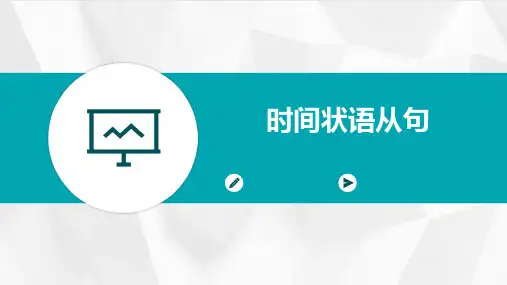

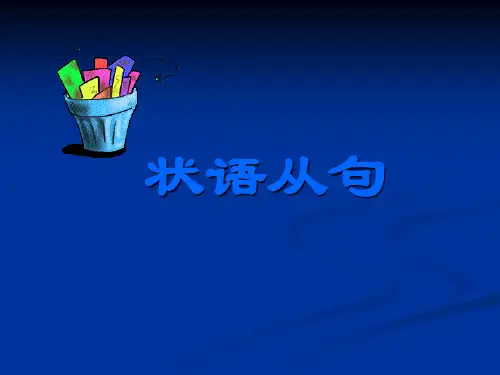

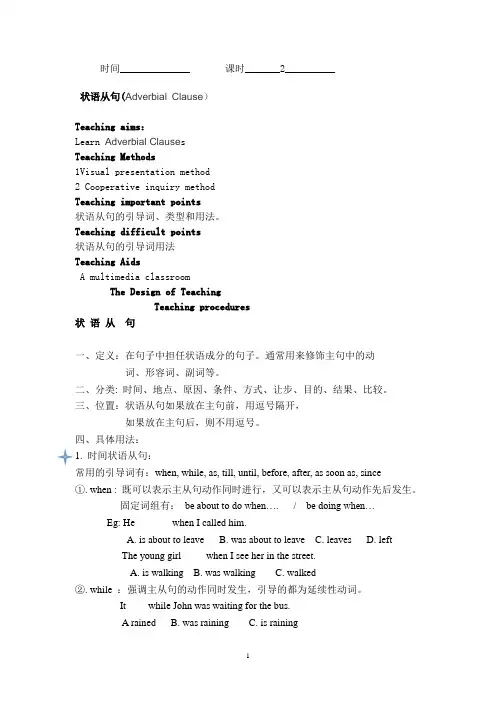
时间______________ 课时_______2__________状语从句(Adverbial Clause)Teaching aims:Learn Adverbial Clause sTeaching Methods1Visual presentation method2 Cooperative inquiry methodTeaching important points状语从句的引导词、类型和用法。
Teaching difficult points状语从句的引导词用法Teaching AidsA multimedia classroomThe Design of TeachingTeaching procedures状语从句一、定义:在句子中担任状语成分的句子。
通常用来修饰主句中的动词、形容词、副词等。
二、分类: 时间、地点、原因、条件、方式、让步、目的、结果、比较。
三、位置:状语从句如果放在主句前,用逗号隔开,如果放在主句后,则不用逗号。
四、具体用法:1. 时间状语从句:常用的引导词有:when, while, as, till, until, before, after, as soon as, since①. when : 既可以表示主从句动作同时进行,又可以表示主从句动作先后发生。
固定词组有:be about to do when…. / be doing when…Eg: He_______ when I called him.A. is about to leaveB. was about to leaveC. leavesD. leftThe young girl ____ when I see her in the street.A. is walkingB. was walkingC. walked②. while :强调主从句的动作同时发生,引导的都为延续性动词。

Chapter 12 job hunting课文语言点1,make mistakes 意为“犯错,出错”= make a mistakemake mistakes in ... 意为“在某方面犯错误”Did you make mistakes again ?你又犯错误了吗?I made a mistake in spelling 我犯了一个拼写错误by mistake 错误地I took your book by mistake 我错拿了你的书mistake 还可作动词,意为“弄错,误解”mistake ...for 意为“把...错认为...”she is often mistaken for a teacher 她经常被误认为是个老师2,hunt vi 意为“搜寻,寻找”常与for 构成短语hunt for ,意为“寻找,搜寻”He has hunted everywhere for his key 。
他处找他的钥匙She began to hunt for a job after she left school 她毕业后就开始找工作3,application 名词,意为“申请,请求”He sent in his application to the company 他向公司提交了申请书。
make an application for = apply for “申请”Who will make an application for the job ?= who will apply for the job ?谁会申请这份工作?4,interview v/ n 面试,采访do an interview “采访”The boss interviewed the person who applied for the job老板面试了这个求职的人interviewee n 被面试者雇员interviewer n 面试者,雇主5,require vt 意为“需要,要求”后跟名词、代词作宾语。
列举英语语法状语从句的归纳总结列举英语语法状语从句的归纳总结在复合句中修饰主句或主句中的某一成分的从句叫状语从句。
状语从句通常由从属连词或起连词作用的词组引导,有时甚至不需要连词直接和主句连接起来。
状语从句根据它表达的意思不同,可分为时间、地点、原因、目的、结果、条件、方式、比较、让步等九类。
一、时间状语从句时间状语从句是表示时间关系的从句。
可以引导时间状语从句的.连词很多,根据意义和主从句之间的时间关系,通常可分为以下几种情况:A. when, while, as, wheneverwhen, while, as表示主句谓语作和从句的谓语动作同时发生或几乎同时发生。
1.when①when表示点时间时,从句中用短暂性动词;表示段时间时,用持续性动词。
When I got home, my family were already having dinner.我到家的时候,全家已在吃晚饭。
(when表示点时间)When they were still talking and laughing, the teacher came in.当他们还在说笑的时候,老师进来了。
(when表示段时间)He waved ahello when he saw her.当他看见她的时候,就挥手打了个招呼。
(when表示点时间)When you think you know nothing, you begin to know something.当你认为自己一无所知的时候,就开始知道一些事情了。
(when 表示段时间)注意:当when意思是正当……时候(and at that moment)时,when 只能跟在前一分句之后。
He was about to go to bed when the doorbel rang.他正要上床,忽然门铃响了。
They were watching the World Cup when suddenly the lights went out.他们正看着世界杯比赛,突然灯灭了。